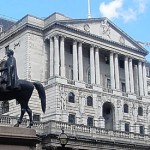The Bank of England has warned that the UK banking system could incur consumer credit losses of around £30 billion if there is another economic downturn – £10 million more than previous estimates. To guard against any future credit losses the Bank is requiring lenders to hold an extra £10 billion in capital. The Bank’s […]
 The Bank of England has warned that the UK banking system could incur consumer credit losses of around £30 billion if there is another economic downturn – £10 million more than previous estimates.
The Bank of England has warned that the UK banking system could incur consumer credit losses of around £30 billion if there is another economic downturn – £10 million more than previous estimates.
To guard against any future credit losses the Bank is requiring lenders to hold an extra £10 billion in capital.
The Bank’s Financial Policy Committee said: “Lenders overall are placing too much weight on the recent performance of consumer lending in benign conditions as an indicator of underlying credit quality. As a result, they have been underestimating the losses they could incur in a downturn.”
The FPC said that with the rapid growth of consumer credit there was a “pocket of risk”.
This is not seen as a material risk to economic growth as consumer credit represents only 11% of overall household debt.
However, it is a risk to banks’ ability to withstand severe economic downturns as borrowers with these loans are more likely to default.
Alex Brazier, the Bank’s financial stability director, said in July that lending standards could potentially enter a “spiral of complacency”.
Consumer debt has soared in the past year, with outstanding car loans, credit card balance transfer and personal loans increasing by 10%, compared to household incomes which have risen by only 1.5%.
The Bank has already told Britain’s lenders that they must set aside £11.4 billion of capital in the next 18 months to make them more resilient to the risk of rising consumer debt.
The Bank also highlighted concerns about the impact of Brexit on the financial services sector, in particular the £20 trillion derivatives market.
Paul Hollingsworth, economist at Capital Economics, said that the additional £10 billion requirement was “not especially large” compared to the £280 billion of core capital held by banks.
“The amount will be set on a bank-by-bank basis once the full results of the 2017 stress test are published in November, so some will be hit harder than others.
“With inflation likely to fall back after peaking around October, and some acceleration in wage growth in prospect, the foundations for spending growth next year should be stronger, so concerns about consumer credit are likely to diminish, rather than build further.”
The Bank has signalled it may have to raise interest rates to combat rising inflation in the coming months from their current record low of 0.25%.














